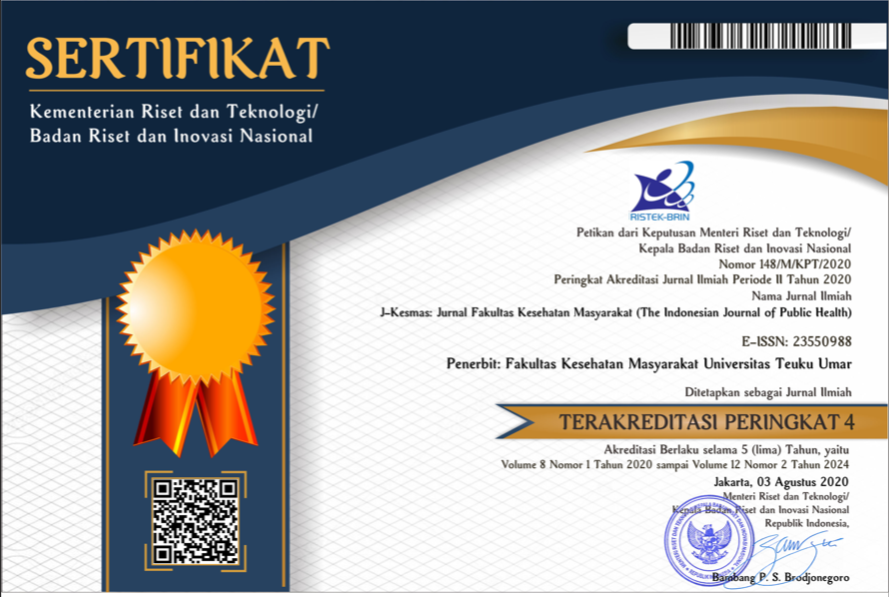The Relationship Between Screen Time and Nutritional Status of Children at SDN 060838 Medan in 2024
Abstract
Excess weight in children and adolescents is a global health problem that can result in various serious complications. One of the main factors that trigger obesity is lack of physical activity, which is largely influenced by the length of time using screen devices. Screen use of more than two hours a day has been linked to increased sedentary behavior, decreased physical activity, disrupted sleep patterns, and unhealthy eating patterns, all of which contribute significantly to the risk of obesity. This study aims to assess the relationship between duration of screen use and nutritional status among students at SDN 060838 in Medan City. With a cross-sectional analytical research design, the sample used was 50 students selected from a population of 198 students. Data were analyzed using the Mann-Whitney test, which showed a statistically significant relationship between screen time duration and nutritional status (p < 0.001). These results emphasize the importance of managing screen time as a key element in preventing obesity in children. Appropriate policies and guidelines are needed to support their health and well-being, especially amidst the increasing use of screen devices for social and educational needs.
Keywords
Full Text:
PDFReferences
Alfinnia, S., Muniroh, L., & Raditya Atmaka, D. (2021). Hubungan Screen Based Activity dan Perilaku Makan dengan Status Gizi Anak Usia 10-12 Tahun (Studi di SDI Darush Sholihin Kabupaten Nganjuk) Relationship between Screen Based Activity, Eating Behavior, and Eating Quality with Nutritional Status of Children Aged 10-12 Years (Studi in Islamic Elementary School Darush Sholihin Nganjuk District). Amerta Nutr, 223–229. https://doi.org/10.20473/amnt.v5i3.2021
Bartosiewicz, A., Łuszczki, E., Kuchciak, M., Bobula, G., Oleksy, Ł., Stolarczyk, A., & Dereń, K. (2020). Children’s body mass index depending on dietary patterns, the use of technological devices, the internet and sleep on bmi in children. International Journal of Environmental Research and Public Health, 17(20), 1–17. https://doi.org/10.3390/ijerph17207492
Byrne, R., Terranova, C. O., & Trost, S. G. (2021). Measurement of screen time among young children aged 0–6 years: A systematic review. In Obesity Reviews (Vol. 22, Issue 8). John Wiley and Sons Inc. https://doi.org/10.1111/obr.13260
Garcia-Conde, M. G., Marin, L., de Maya, S. R., & Cuestas, P. J. (2020). Parental attitudes to childhood overweight: The multiple paths through healthy eating, screen use, and sleeping time. International Journal of Environmental Research and Public Health, 17(21), 1–12. https://doi.org/10.3390/ijerph17217885
Goncalves, W. S. F., Byrne, R., Viana, M. T., & Trost, S. G. (2019). Parental influences on screen time and weight status among preschool children from Brazil: A cross-sectional study. International Journal of Behavioral Nutrition and Physical Activity, 16(1). https://doi.org/10.1186/s12966-019-0788-3
Jebeile, H., Kelly, A. S., O’Malley, G., & Baur, L. A. (2022). Obesity in children and adolescents: epidemiology, causes, assessment, and management. In The Lancet Diabetes and Endocrinology (Vol. 10, Issue 5, pp. 351–365). Elsevier Ltd. https://doi.org/10.1016/S2213-8587(22)00047-X
Liu, Y., Sun, X., Zhang, E., Li, H., Ge, X., Hu, F., Cai, Y., & Xiang, M. (2023). Association between Types of Screen time and Weight Status during the COVID-19 Pandemic: A Longitudinal Study in Children and Adolescents. Nutrients, 15(9). https://doi.org/10.3390/nu15092055
Pratiwi, R., & Mardiyati, N. L. 2018. Screen time dengan Konsumsi Sayur dan Buah serta Kenaikan Berat Badan pada Mahasiswa Fakultas Ilmu Kesehatan. Jurnal Nutrisia, 20(2):53–60.
Nagata, J. M., Iyer, P., Chu, J., Baker, F. C., Gabriel, K. P., Garber, A. K., Murray, S. B., Bibbins-Domingo, K., & Ganson, K. T. (2021). Contemporary screen time usage among children 9–10-years-old is associated with higher body mass index percentile at 1-year follow-up: A prospective cohort study. Pediatric Obesity, 16(12). https://doi.org/10.1111/ijpo.12827
Wen, L. M., Xu, H., Taki, S., Buchanan, L., Rissel, C., Phongsavan, P., Hayes, A. J., Bedford, K., Moreton, R., & Baur, L. A. (2022). Effects of telephone support or short message service on body mass index, eating and screen time behaviours of children age 2 years: A 3-arm randomized controlled trial. Pediatric Obesity, 17(5). https://doi.org/10.1111/ijpo.12875
Wu, Y., Amirfakhraei, A., Ebrahimzadeh, F., Jahangiry, L., & Abbasalizad-Farhangi, M. (2022). Screen time and Body Mass Index Among Children and Adolescents: A Systematic Review and Meta-Analysis. In Frontiers in Pediatrics (Vol. 10). Frontiers Media S.A. https://doi.org/10.3389/fped.2022.822108.
DOI: https://doi.org/10.35308/j-kesmas.v11i2.10373
Refbacks
- There are currently no refbacks.
Managed by Fakultas Kesehatan Masyarakat
Published by Universitas Teuku Umar
Website: http://jurnal.utu.ac.id/jkesmas
Email: jkemas@utu.ac.id 
This work is licensed under a Creative Commons Attribution-ShareAlike 4.0 International License.







.jpg)


